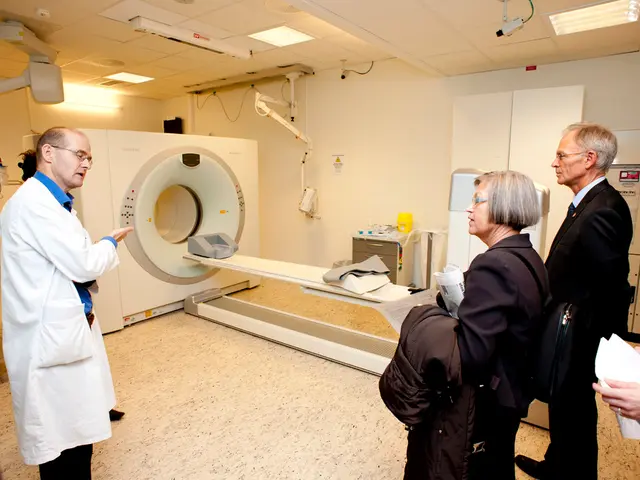Guidelines for Maintaining Privacy in Healthcare and Social Services: Comprehensive Insights
Health and Social Care Confidentiality: A Comprehensive Guide for Professionals
In the realm of health and social care, respecting confidentiality is more than just a legal requirement—it’s an essential pillar for building trust and delivering quality care. But what exactly does maintaining confidentiality entail? Let’s explore!
The Lowdown on Confidentiality in Health and Social Care
Confidentiality in this setting means keeping private the sensitive information that service users choose to share about their health, personal lives, or relationships. It’s the responsibility of healthcare providers to ensure this information is securely handled and protected from unauthorized access.
Why Keeping It Private Matters
The significance of confidentiality lies in its role in fostering trust and adherence to ethical standards. When individuals feel confident that their private information is being safeguarded, they are empowered to share crucial details about their health, resulting in better care and tailored support.
Compliance with confidentiality regulations is also crucial for avoiding legal penalties such as fines, lawsuits, and potential harm to service users.
Practical Confidentiality: Make It a Habit
Maintaining confidentiality in health and social care doesn’t need to be rocket science. Here are three straightforward practices for keeping the information of service users secure:
- Secure Data Storage Keep sensitive information safe by making use of secure data storage solutions, such as encrypted digital systems and locked filing cabinets for physical records.
- Discreet Communication When it comes to discussing sensitive matters with colleagues, always opt for private settings or encrypted channels to avoid accidental disclosure to the wrong parties.
- Clear Consent Protocols Always seek consent before sharing personal information with others. But remember: there are exceptions, such as legal or safety concerns, where confidentiality may need to be breached.
Common Law of Confidentiality: An Ethical Obligation
Adhering to the common law duty of confidentiality helps to foster an environment where individuals feel comfortable sharing their concerns, knowing that their data will be treated with utmost respect. However, in cases where breaking confidentiality is necessary to protect an individual or others, it is permissible—and often required.
From Theory to Practice: Confidentiality in Action
In the trenches of health and social care, there are numerous examples of how confidentiality plays a crucial role. Here are three key instances:
- Relationship concerns If a service user shares intimate details about their personal relationships, it's important to respect that request and refrain from disclosing the information without consent.
- Health details When discussing a service user's health condition, it's vital to keep the details confidential and to seek consent before discussing their health with others.
- Personal details Service users' names, addresses, or financial details should be accessible only to those directly involved in their care.
Breaking the Confidentiality Code: When and How
While maintaining confidentiality is essential in most situations, there are circumstances where it may be necessary to breach that code. For example, if a service user is at risk of harm or poses a threat to others, sharing information becomes essential. In such cases, it's crucial to seek guidance from a manager on the appropriate steps to take.
The Wrap-Up
Confidentiality in health and social care is a delicate process that balances the needs of service users with the demands of maintaining a safe and secure environment. Failing to uphold confidentiality guidelines can have significant consequences, but adhering to them is essential for fostering trust and promoting high-quality care.
If you're keen on making a difference in the health and social care industry, staying informed and knowledgeable about the varying aspects of confidentiality is essential. So, dive deeper into this topic by enrolling in an online health and social care course and furthering your understanding of the ethical, legal, and practical aspects of maintaining confidentiality in this vital field.
In the realm of personal growth and self-development, understanding the importance of confidentiality in various aspects of life can lead to better relationships, enhanced productivity, and personal success.
Confidentiality in Mental HealthSharing personal mental health struggles requires trust, and confidentiality plays a crucial role in fostering that trust. Mental health therapies and treatments should be approached with utmost discretion to create a safe space for open communication.
Online Courses and Learning Management SystemsWhen enrolled in online learning platforms offering courses in coding, science, entrepreneurship, or global cuisines, the privacy of personal information and academic progress should be safeguarded.
Workplace-Wellness ProgramsConfidentiality is essential in workplace-wellness programs, particularly when addressing mental health issues, medical conditions, chronic diseases, or other sensitive topics related to employee health and wellness.
The Role of Technology in Health and WellnessAs wearables, smart home devices, and smartphones become more integrated into daily life, it's crucial to ensure that the data collected regarding health, fitness, and lifestyle choices remains secure.
Financial Management and Personal FinanceIn matters of finance, wealth management, and careers, maintaining confidentiality is vital for fostering trust among clients and protecting their financial interests.
Diversity, Equity, and InclusionWhen discussing sensitive topics like race, gender, or sexual orientation in the workplace or educational settings, it's essential to respect confidentiality and ensure that all conversations are held in a safe and inclusive environment.
Health and Fitness IndustryIn fitness and exercise, promoting a healthy lifestyle often involves discussing personal health conditions, goals, and progress. Confidentiality helps create a supportive environment for individuals striving to improve their physical and mental well-being.
Digestive Health and Skin CareWhen dealing with digestive health concerns or skin conditions, ensuring confidentiality helps individuals feel comfortable discussing their symptoms and seeking appropriate therapies and treatments.
Food and Drink, Home and Garden, and Sustainable LivingIn culinary pursuits, including baking, cooking, and global cuisines, or endeavors related to home and garden, home improvement, and sustainable living, respecting confidentiality helps maintain a supportive and trusting environment.
Confidentiality in Leadership and Professional SettingsIn positions of leadership, it's essential to uphold confidentiality, especially when dealing with sensitive matters, such as employee performance reviews, promotions, or disciplinary actions.
Medical Conditions and Chronic DiseasesFor those dealing with life-changing medical conditions or chronic diseases, such as cancer, respiratory conditions, neurological disorders, or autoimmune disorders, maintaining confidentiality allows individuals to focus on their health and well-being without fear of judgment or stigma.
Productivity, Product-Reviews, and ShoppingWhen shopping for gadgets, appliances, or seeking advice on productivity tools, maintaining confidentiality protects personal preferences and purchasing habits.
Mindfulness, Relationships, and Family DynamicsIn matters of mindfulness, personal growth, and family dynamics, confidentiality helps create safe spaces for open and honest communication, promoting healthier relationships and overall well-being.
Data and Cloud Computing, Interior Design, and GardeningIn the realm of data and cloud computing, interior design, or gardening, respecting confidentiality is essential in building trust among colleagues, clients, and partners.
Dealing with Challenges and Finding SolutionsWhen confronted with personal or professional obstacles, it's important to seek out resources and strategies, such as seeking guidance from mentors, enrolling in workshops, or exploring various deals and discounts on education and self-development materials.
In all aspects of life, confidentiality plays a vital role in fostering trust, promoting open communication, and ensuring safety and well-being. Understanding its importance and adhering to best practices is essential for building a better, more inclusive, and informed society.






